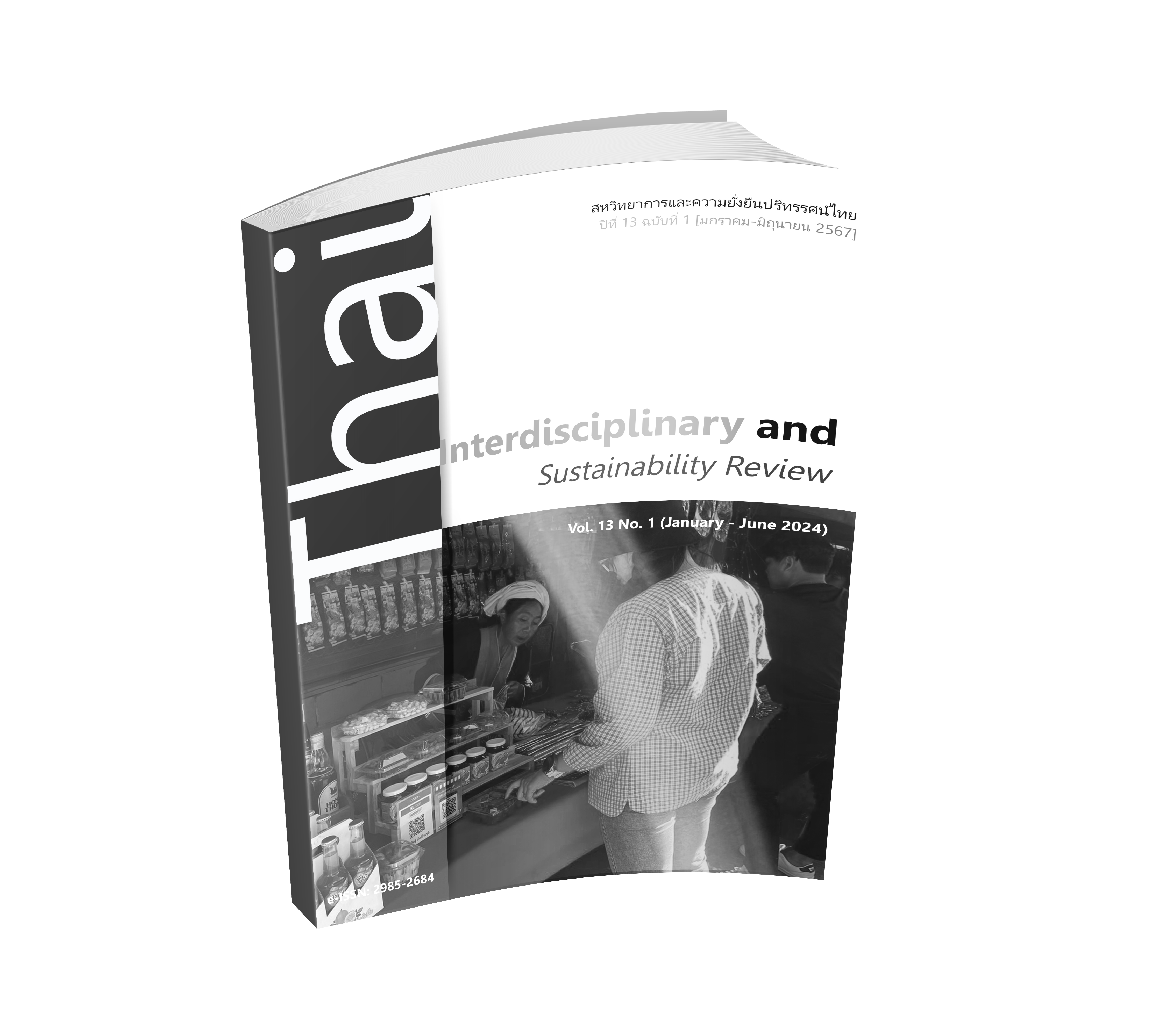THE DEVELOPMENT OF A POSITIVE STRATEGY FOR SELF-MANAGEMENT TO ENHANCE NEW NORMAL WELL-BEING IMMUNITY OF DIABETES MELLITUS PATIENTS
DOI:
https://doi.org/10.14456/tisr.2024.12Keywords:
Positive Strategies, Self-Management, Well-Being Immunity, New Normal, Diabetes Mellitus PatientsAbstract
This basic mixed method research design aimed to develop a positive strategy for self-management to enhance new normal well-being immunity of diabetes mellitus patients. The sample group was diabetes mellitus patients in Samut Prakan Province; 847 cases were recruited from multi-stage sampling. The research results were as follows: 1) Results of the Confirm Factor Analysis (CFA) study of the well-being immunity of the new normal diabetes mellitus patients were consistent with the empirical data with a construct reliability ρc of 0.820 and the average variance extraction ρvof 0.559. 2) The total mean score of well-being immunity of the new normal diabetes mellitus revealed a mean level 3) The positive strategy for self-management was developed by integrating the positive psychology concept, the self-management concept, and the concept of health literacy, 4) The new normal well-being immunity of diabetes mellitus patients of the experimental group in posttest and follow-up were significantly higher than the pretest at .01 level and significantly higher than that of the control group at .01 level.
Downloads
References
กรมควบคุมโรค. (2564). รณรงค์วันเบาหวานโลก ปี 2564 ตระหนักถึงการดูแลรักษาโรคเบาหวาน ให้ได้รับการรักษาอย่างทั่วถึง. สืบค้นจาก https://ddc.moph.go.th/brc/news.php?news=%2021692&deptcode=brc.
กรมสุขภาพจิต. (2562). คู่มือสร้างสรรค์พลังใจให้วัยทีน. กรุงเทพฯ: บียอนด์ พับลิสซิ่ง จำกัด.
กองส่งเสริมและพัฒนาสุขภาพจิต. (2563). องค์ความรู้การดูแลสุขภาพใจในสถานการณ์การระบาดโควิด-19 “ใจพร้อม ไม่ยอมป่วย”. นนทบุรี: กระทรวงสาธารณสุข.
ชัญญาภัค คงทน. (2560). วิเคราะห์ปัจจัยเพื่อทำนายพฤติกรรมการส่งเสริมสุขภาพของผู้ป่วยโรคเบาหวานชนิดที่ 2 ตำบลบ้านกลาง อำเภอเมือง จังหวัดปทุมธานี. วารสารโรงพยาบาลแพร่, 25(1), 24-35.
ทองสา บุตรงาม, จารุมาศ แสงสว่าง, เขมิกา อารมณ์ และ ศิริศักดิ์ มากมี. (2566). พฤติกรรมการปรับตัวบนชีวิตวิถีใหม่ หลังสถานการณ์การแพร่ระบาดโรคติดเชื้อไวรัสโคโรนา 2019 ของประชาชนในจังหวัดบุรีรัมย์. ราชาวดีสาร วิทยาลัยพยาบาลบรมราชชนนี สุรินทร์, 13(1), 1-12.
ภาวนา กีรติยุตวงศ์ และ สมจิต หนุเจริญกุล. (2553). การติดตามประสิทธิภาพในระยะยาวของโปรแกรมการจัดการดูแลตนเองในผู้ที่เป็นโรคเบาหวานชนิดที่ 2. วารสารวิจัยและนวัตกรรมทางการพยาบาล, 16(2), 293-308.
สำนักงานราชบัณฑิตยสภา. (2553). พจนานุกรมศัพท์จิตวิทยา ฉบับราชบัณฑิตยสถาน. กรุงเทพฯ: ไอเดียสแควร์.
อุดมพร พรหมด้วง. (2558). การพัฒนารูปแบบการดูแลผู้ป่วยเบาหวาน โรงพยาบาลบ้านตาขุน. วารสารวิชาการแพทย์ เขต 11, 29(3), 475-486.
Boehm, J., Peterson, C., Kivimaki, M., & Kubzansky, L. (2011). A Prospective Study of Positive Psychological Well-Being and Coronary Heart Disease. Health Psychology, 30(3), 259-267.
Chen, M., Wang, R., Cheng, C., Chin, C., Stocker, J., Tang, S., & Chen, S. (2011). Diabetes Empowerment Process Scale: Development and Psychometric Testing of the Chinese Version. Journal of Advanced Nursing, 67(1), 204-214.
Creer, T. (2000). Self-Management of Chronic Illness. In Handbook of self-regulation (pp. 601-629). Massachusetts: Academic Press.
Creswell, J. (2011). Educational Research: Planning, Conducting, and Evaluating Quantative and Qualitative Research. New Jersey: Pearson Education International.
du Pon, E., Wildeboer, A., van Dooren, A., Bilo, H., Kleefstra, N., & van Dulmen, S. (2019). Active Participation of Patients with Type 2 Diabetes in Consultations with Their Primary Care Practice Nurses-What Helps and What Hinders: A Qualitative Study. BMC Health Services Research, 19, 814.
Duftschmid, G., Rinner, C., Sauter, S., Endel, G., Klimek, P., Mitsch, C., & Heinzl, H. (2019). Patient-Sharing Relations in the Treatment of Diabetes and Their Implications for Health Information Exchange: Claims-Based Analysis. JMIR Medical Informatics, 7(2), e12172.
Faghir-Gangi, M., Moameri, H., Abdolmohamadi, N., & Nematollahi, S. (2020). The Prevalence of Type 2 Diabetes in Patients with COVID-19: A Systematic Review and Meta-Analysis. Clinical Diabetology, 9(5), 271-278.
Hair, J., Black, W., Babin, B., & Anderson, R. (2010). Multivariate Data Analysis. 7th ed. New York: Pearson Prentice Hall.
Inzucchi, S., Bergenstal, R., Buse, J., Diamant, M., Ferrannini, E., Nauck, M., Peters, A., Tsapas, A., Wender, R., & Matthews, D. (2015). Management of Hyperglycemia in Type 2 Diabetes, 2015: A Patient-Centered Approach: Update to a Position Statement of the American Diabetes Association and the European Association for the Study of Diabetes. Diabetes Care, 38(1), 140-149.
Khoshouei, M. (2009). Psychometric Evaluation of the Connor-Davidson Resilience Scale (CD-RISC) Using Iranian Students. International Journal of Testing, 9(1), 60-66.
Naughton, M., Yi-Frazier, J., Morgan, T., Seid, M., Lawrence, J., Klingensmith, G., Waitzfelder, B., Standiford, D., & Loots, B. (2014). Longitudinal Associations between Sex, Diabetes Self-Care, and Health-Related Quality of Life among Youth with Type 1 or Type 2 Diabetes Mellitus. The Journal of Pediatrics, 164(6), 1376-1383.
Nutbeam, D. (2008). The Evolving Concept of Health Literacy. Social Science & Medicine, 67(12), 2072-2078.
Rosta, L., Menyhart, A., Mahmeed, W., Al-Rasadi, K., Al-Alawi, K., Banach, M., Banerjee, Y., Ceriello, A., Cesur, M., Cosentino, F., Firenze, A., Galia, M., Goh, S., Janez, A., Kalra, S., Kapoor, N., Lessan, N., Lotufo, P., Papanas, N., Rizvi, A., Sahebkar, A., Santos, R., Stoian, A., Toth, P., Viswanathan, V., Kempler, P., & Rizzo, M. (2023). Telemedicine for Diabetes Management during COVID-19: What we have Learnt, What and How to Implement. Frontiers in Endocrinology, 14, 1129793.
Schreurs, K., Colland, V., Kuijer, R., de Ridder, D., & van Elderen, T. (2003). Development, Content, and Process Evaluation of a Short Self-Management Intervention in Patients with Chronic Diseases Requiring Self-Care Behaviors. Patient Education and Counseling, 51(2), 133-141.
Seligman, M., & Csikszentmihalyi, M. (2000). Positive Psychology: An Introduction. American Psychologist, 55(1), 5-14.
Seligman, M., & Csikszentmihalyi, M. (2014). Positive Psychology: An Introduction. In M. Csikszentmihalyi. (ed.). Flow and the Foundations of Positive Psychology (pp. 279-298). Dordrecht: Springer.
Yu, J., Xu, T., James, R., Lu, W., & Hoffman, J. (2020). Relationship between Diabetes, Stress, and Self-Management to Inform Chronic Disease Product Development: Retrospective Cross-Sectional Study. JMIR Diabetes, 5(4), e20888.

Downloads
Published
How to Cite
Issue
Section
License
Copyright (c) 2024 Authors

This work is licensed under a Creative Commons Attribution-NonCommercial-NoDerivatives 4.0 International License.









.png)


